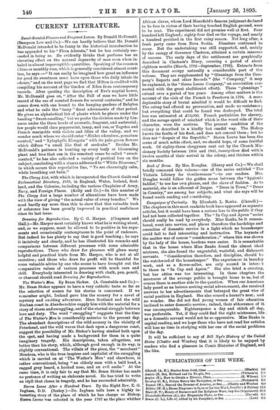African slaves, whom Lord Mansfield's famous judgment declared to be
free in virtue of their having touched English ground, were to be sent. The experiment did not promise well at first. Four hundred left England ; eighty-four died on the voyage, and nearly a hundred perished in the first rainy season. Not long after, a fresh party came from Nova Scotia. Disasters continued to occur. But the undertaking was still supported, and, mainly by the energy of Governor Clarkeon, attained a certain measure of success. The early days of the settlement are graphically described in Clarkson's Diary, covering a period of about eighteen months (March, 1792—September, 1793). Extracts from this document occupy naturally a considerable part of the• volume. They are supplemented by "Gleanings from the Com- pany's Reports and other Records " (the " Company," it may be explained, is the "Sierra Leone Company," an association con- nected with the great abolitionist effort). These "gleanings " extend over a period of ten years. Among other matters is the account of the visit of the French to Freetown in 1794. A morn deplorable story of brutal mischief it would be difficult to find. The colony had offered no provocation, and made no resistance ; but everything that could be found was destroyed. The total loss was estimated at £54,000. French partialities for slavery, and the savage spirit of mischief which is the worst side of their character, were the motives. The present condition of the colony is described in a kindly but candid way. The Bishop knows the faults of his flock, and does not conceal them ; but he does not "despair of the Republic." Sierra Leone has been the scene of much noble effort, and, we should hope, of some fruitful work. Of eighty-three clergymen sent out by the Church Mis-
sionary Society between 1804 and 1841, twenty-three died with:n twelve months of their arrival in the colony, and thirteen within. six months.


















































 Previous page
Previous page